What is Fight Club trying to say?
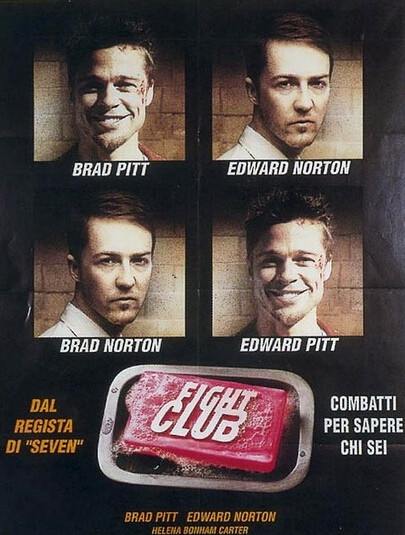
What is Fight Club trying to say? Is it just to tell the story of schizophrenia? What is the use of love in it?
1.When I was a junior in college, I saw the film of Fight Club and was so impressed that I read the novel at least nine times to the point where I could recite it. I find the existing critique of such a great work a little too narrow. Fight Club’s schizophrenia is more than just the protagonist’s schizophrenia. I think it’s a more fundamental social schizophrenia, between the maternal, constantly gratified, gentle, hyper-consumer society on the one hand, and the destructive, desperate society represented by Taylor on the other. Because the patriarchal society has been fundamentally attacked after a lot of movements in the United States, its revival cannot be simply “go back to the past and be a good father” anymore, but develop into a suicidal organization that desperately retaliates against the society after discovering that the father has run away. This desperate society is generated from a highly consuming society. Simply put, when consumption reaches a certain level, despair is inevitable and consumption cannot provide people with permanent satisfaction. That’s why Marx said capitalism produces its own gravediggers. The contrast between the two societies is stark. The smooth, scarless society of consumerism contrasts with Taylor’s, which scarred everyone in his own society. Consumerism creates an illusion of eternal protection, but it’s a false illusion that will be shattered sooner or later. The explosion of the world’s tallest building at the end of the film is reminiscent of 9/11, after which Americans felt threatened by terrorism. This is the allegorical dimension of fight club that a lot of people talk about. In the movie, before the world’s highest building was blown up, the hero’s own house was first blown up. If a house was not blown up, the world would be blown up. In the novel, the fight club was founded after the hero’s house was blown up. I told the detective, “No, I didn’t leave the gas burner on before my business trip.” I love my life. I love that apartment. I love every piece of my furniture. That’s been my whole life. Everything, the light fixtures, the chairs, the carpets are me. Those plates on the sideboard are me. Those plants are me. The TV was me. I was the one that was blown clean. Why couldn’t he understand?
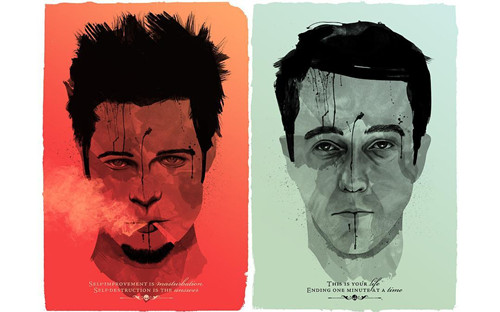
This paragraph is also a good illustration of the objectification of people in a consumerist society. This is a recurring theme in both the film and the novel. Fight Club author Chuck Palahniuk is at his best when he goes on and on about how human beings are objectified by consumer society in a very funny way. At one point, he writes, “There’s no moral difference between killing a person and killing a car.” (It’s all goods)
2.The fight club is a fable, it is an exaggerated stage play, whether it is true, whether it is feasible, is not the consideration of the fable. The hero doesn’t even have a name in the novel. I think the first power of the parable is the way it brings together anxieties, anxieties about masculinity through Bob. In the movie, Tyler and Jack sneer at working out on the bus. Because many men get a sense of security through fitness, in fact, it is a kind of consumer society thinking, seeing themselves as things. To secure himself as a perfect commodity, the novel describes Bob, who takes too much testosterone to keep fit and ends up having his testicles removed: everything you were proud of will be thrown away as rubbish. Anxiety about masculinity, overworking out, turning yourself into a dummy, and by the time you find out it’s too late, don’t talk about masculinity, you can’t even be a man. It’s also a powerful expression of consumerism, of course. Bob is crying because he had his testicles removed six months ago. Then hormone maintenance therapy. Bob got tits because his testosterone was too high. Testosterone rises too high, and your body elevates estrogen to maintain balance. At such times I cry, because your life has nothing, even worse than nothing, a blank. At first, both the protagonist and Bob would be anxious because they were blank. Later, after the protagonist separated, he found that it was good to have nothing. “It is because I have nothing that I can do everything.” Such is the usual comparison of two dogs in the meme, with the sad one saying: “I have nothing, I’m in trouble, consumerism is killing me.” The strong one says, “I have nothing. Yeah, thank you, consumerism.”
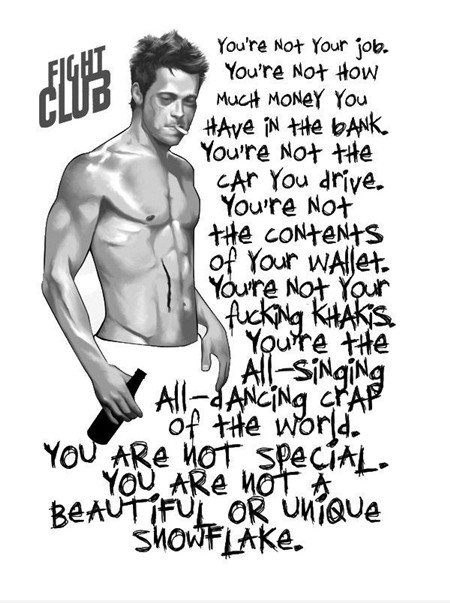
3.The poor have the anxiety of the poor, and the rich have the anxiety of the rich, and their anxiety is of course the revenge of the poor, the “ingredients” added to their soup, which by the way is an urban legend that has been around for many years in the United States, which will warn you not to use the color of the sauce and so on. More anxious, of course, was the hysterical retaliation of the poor, the fear of Tyler, the fear of 9/11. Fight Club, in short, presents an age of great anxiety. It’s apocalyptic at the end of the world. There are also structural parallels with consumerism itself, in the sense that fight club is expanding rapidly and without limits. Fight club film is considered the most incite a passage, “we become a rock star, multimillionaire” that a itself from the novel, the other in the novel not only destroyed the people, don’t think consumerism, Taylor also natural also destroyed, but revenge consumer society is not make environmentalism, but accelerate, consumerism has not been destroyed but will be destroyed sooner or later things had destroyed in advance, This part of the novel is very powerful: Taylor once said that we are all the shit and slaves of history, and that’s exactly how I feel. I want to destroy all the beautiful things that have never been mine. Burning the rainforest in the Amazon. Shooting chlorofluorocarbons directly into the air would eat up the ozone layer. Open the safety valve on the supertanker and lift the cap on the offshore oil well. I want to kill all the fish I can’t afford, and bury all the beaches in France that I’ve never been able to see. I want the whole world to go down forever. While slapping that kid, I wanted to take a shot at every endangered giant panda and wipe out the species, as well as every desperate whale or dolphin that beached itself. Don’t think of this as extinction. Think of it as downsizing. For thousands of years, humans have been making waves on this planet, creating trash and spreading trash everywhere, and now history expects me to clean it up. I had to wash and stomp on my soup tin. I had to account for every drop of motor oil I used. Downsizing is a commercial term in the novel that can symbolize the logic of consumerism. “Don’t think of it as firing, think of it as downsizing,” which ironically means, you’re not trying to downsizing, are you? Let’s just speed it up.
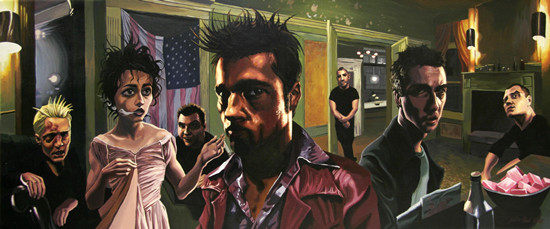
4.At the same time, Fight Club is a somewhat futuristic satire of the new century’s contemplative practice, which many in the West believe is a way to keep away from consumerism. But as Zizek has pointed out, the ideology of today’s consumerism is precisely that ideology, and it is the one best suited to late capitalist consumerism: according to Buddhism and Taoism, we should not try to adapt ourselves to accelerating technological and social change… What we need to do is to let go of our ego and maintain a detached inner distance from all this crazily accelerating progress. If the sociologist Max Weber were alive today, he might write a sequel to his famous book, “The Protestant Ethic and the Spirit of Capitalism”, entitled “The Taoist Ethic and the Spirit of Global Capitalism”. The wisdom of Eastern religions has been reduced to a kind of health opium that escapes from society, leaving Westerners to simply ignore reality. Fight Club demonstrates the deceptiveness of this ideology through an absurd scene in which the hero of the support group and Marla “fight over” various diseases. So-called spirituality may also be a disease. The only saving grace is that the penguin in the fantasy is really cute.
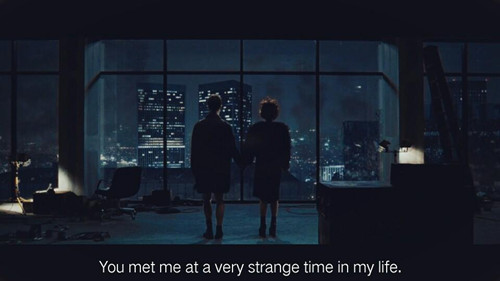
5.The ending of the novel is different from the ending of the movie, and at first I refused the ending of the movie version. I feel that there is so much emphasis on the love between the protagonist and Marla (which is also an important theme throughout the novel) that it may have blurred the larger themes. The novel version ends with the hero getting blown up and waking up in heaven to find that the fight club people have sneaked into heaven and are waiting for his command… A: We look forward to seeing you, Mr. Taylor. It was really Tyler Durden. In short, the novel has a circular structure, and the film ends with a sublime moment in which the hero and Mara, holding hands, watch the building explode. Now that I think about it, the movie really got the gist of the novel. There is a moment in the novel when the protagonist and Taylor meet for the first time: Taylor created the shadow of a giant hand. Only now the fingers were as long as a vampire’s and the thumb was too short, but he said that at half past four the hand was perfect. The shadow palm held flawlessly for a minute, and Tyler sat in the perfect palm of his own creation for a minute. You wake up and you don’t know where you are. One minute is enough, Tyler says. It takes a lot of hard work, but one minute of perfection is worth the effort. That’s the best you can hope for perfection. You wake up, that’s enough.
This paragraph is a perfect commentary on the ending of the movie. This section is really quite Zen, many of the novel about the dream and wake up fragments are a little Zhuangzi feeling.
